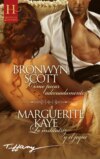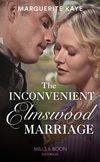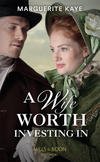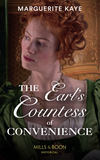Czytaj książkę: «The Truth Behind Their Practical Marriage»
A marriage hiding secrets
…but forged by passion!
A Penniless Brides of Convenience story. Miss Estelle Brannagh has never met a man who’s tempted her to renounce her hard-won independence—until an encounter with Irish landowner Aidan Malahide blossoms into spine-tingling attraction. He’s carefree and charismatic; accepting his proposal seems practical and shockingly desirable! Yet Aidan is hiding a dark secret, and it will take all of Estelle’s courage to ensure it doesn’t tear them apart…
MARGUERITE KAYE writes hot historical romances from her home in cold and usually rainy Scotland, featuring Regency rakes, Highlanders and sheikhs. She has published over forty books and novellas. When she’s not writing she enjoys walking, cycling—but only on the level—gardening—but only what she can eat—and cooking. She also likes to knit and occasionally drink martinis—though not at the same time! Find out more on her website: margueritekaye.com.
Also by Marguerite Kaye
Invitation to a Cornish Christmas
Matches Made in Scandal miniseries
From Governess to Countess
From Courtesan to Convenient Wife
His Rags-to-Riches Contessa
A Scandalous Winter Wedding
Penniless Brides of Convenience miniseries
The Earl’s Countess of Convenience
A Wife Worth Investing In
The Truth Behind Their Practical Marriage
And look out for the next book
coming soon
Discover more at millsandboon.co.uk.
The Truth Behind Their Practical Marriage
Marguerite Kaye

ISBN: 978-1-474-08951-7
THE TRUTH BEHIND THEIR PRACTICAL MARRIAGE
© 2019 Marguerite Kaye
Published in Great Britain 2019
by Mills & Boon, an imprint of HarperCollinsPublishers 1 London Bridge Street, London, SE1 9GF
All rights reserved including the right of reproduction in whole or in part in any form. This edition is published by arrangement with Harlequin Books S.A.
This is a work of fiction. Names, characters, places, locations and incidents are purely fictional and bear no relationship to any real life individuals, living or dead, or to any actual places, business establishments, locations, events or incidents. Any resemblance is entirely coincidental.
By payment of the required fees, you are granted the non-exclusive, non-transferable right and licence to download and install this e-book on your personal computer, tablet computer, smart phone or other electronic reading device only (each a “Licensed Device”) and to access, display and read the text of this e-book on-screen on your Licensed Device. Except to the extent any of these acts shall be permitted pursuant to any mandatory provision of applicable law but no further, no part of this e-book or its text or images may be reproduced, transmitted, distributed, translated, converted or adapted for use on another file format, communicated to the public, downloaded, decompiled, reverse engineered, or stored in or introduced into any information storage and retrieval system, in any form or by any means, whether electronic or mechanical, now known or hereinafter invented, without the express written permission of publisher.
® and ™ are trademarks owned and used by the trademark owner and/or its licensee. Trademarks marked with ® are registered with the United Kingdom Patent Office and/or the Office for Harmonisation in the Internal Market and in other countries.
Note to Readers
This ebook contains the following accessibility features which, if supported by your device, can be accessed via your ereader/accessibility settings:
Change of font size and line height
Change of background and font colours
Change of font
Change justification
Text to speech
Contents
Cover
Back Cover Text
About the Author
Booklist
Title Page
Copyright
Note to Readers
Prologue
Chapter One
Chapter Two
Chapter Three
Chapter Four
Chapter Five
Chapter Six
Chapter Seven
Chapter Eight
Chapter Nine
Chapter Ten
Chapter Eleven
Chapter Twelve
Chapter Thirteen
Chapter Fourteen
Historical Note
Extract
About the Publisher
Prologue
October 1832 —Castle Duairc, County Kildare, Ireland
A flurry of rain rattled the windowpane, and a gust of wind found a gap in the casement, making the curtains billow. Shivering, Estelle curled up under the sheets, knowing that sleep would never come. How could it, when in a few short hours she’d finally discover the true reason for her husband’s tortured and self-destructive behaviour.
Another strong gust of wind blew the window open. Jumping out of bed, she wrestled to close it over. A storm was brewing in more ways than one. A shaft of moonlight pierced the thick cloud casting a shadow on the lake, illuminating the ruined tower on the island. It looked stark, brooding, ominous, as befitting a place harbouring dark secrets.
Secrets which had already blighted their marriage. They had lived—no, barely existed—in the shadow of those secrets for far too long. Was it too late to salvage something from the wreckage? Tomorrow, the past would be dug up and the truth unearthed. Whatever that turned out to mean, she was determined not to let it destroy them completely.
Chapter One
May 1832 —Florence, Grand Duchy of Tuscany
She first became aware of him in the Piazza della Signoria. It was a Monday morning and she was enjoying her ritual morning coffee. He was perched on the stone balustrade of the Neptune fountain set in the middle of the piazza, trailing his hands languidly in the water, his back to the looming Palazzo Vecchio. His gaze roamed over the same milling throngs that she had been idly observing, a mixture of tourists and Florentines enjoying the morning sunshine.
There were any number of well-dressed and presentable young men among the crowd. What was it about him that particularly caught her attention? Perhaps it was the fact that he was so obviously not Italian. But then, so were a good many of the passers-by. Was it his looks? But he was not handsome, not in the flamboyant, peacock manner of the local dandies who didn’t so much walk as strut. He had light-brown hair, close-cut, with strong rather than striking features. His skin looked weathered rather than tanned, and his nascent beard could have simply been the result of neglecting to shave for two or three days. Unkempt, that was the word that sprung to mind, for his hair, though short, had a rumpled look, as if it were a stranger to a comb, and his clothes, though clearly the product of expensive tailoring, looked as if they had been donned straight from a valise without the intervention of either a valet or a hot iron. Yet she couldn’t take her eyes off him.
How long she had been staring before their gazes clashed and held, she had no idea. Her insides jolted. It was not recognition, for they most certainly had not met before, but an urging, as if it was imperative that they should meet. He didn’t stare openly in those attenuated moments. She had the impression of being subject to a cool assessment, then surprise was registered in the slight raising of his brow, before he turned away as if shielding himself from view, resenting the intrusion on his thoughts.
In the aftermath, her cheeks heated. Had she been ogling him, the very thing that she loathed being subjected to herself? She had become accustomed, now that she had finally come out into the world, to being assessed, to being leered at and even occasionally accosted. Her flamboyant looks gave men the impression that she welcomed close attention. She did not, but she’d come to expect it, and had become practised too, at rebuffing it. Yet this man had done none of those things. She was being fanciful, she decided, for the piazza had been crowded and he was at least twenty yards away. But the fleeting encounter haunted her for the rest of the day.

She saw him again the next morning, in the same square. Not that she deliberately sought him out, certainly not, it was simply that she went to the same café every morning, at the same time. In the ten days she’d been in the city, it had become her habit to sip one of the small, syrupy cups of Italian coffee there, on the pretext of planning her day. In reality, it was simply another way of whiling away the time—something the Florentines did with élan and at which she had been surprised to discover she too was rather adept.
She wasn’t looking for him, but he was there, and her stomach fluttered when she spotted him, not quite as she’d remembered him but—goodness, if anything even more intriguing! He really wasn’t handsome, and yet that added to his attraction and, as far as she was concerned, made him stand out from the crowd.
He wasn’t sitting at the fountain this time, but inspecting the Medici lions in the Loggia dei Lanzi. He was very tall and solid-looking, built more like a man who earned his living from hard labour than a man of leisure. She liked his dishevelled appearance, it spoke of a man who had more important things on his mind, who had neither any need nor interest in setting out to impress. She cupped her chin in her hand, allowing herself to study him while his attention was focused on the statues. He wasn’t wearing a hat or gloves. Unconventional. That too appealed to her. What was he doing here in Florence? Was he alone? He certainly didn’t have the air of a man with an entourage. Or a valet to iron his rumpled clothes!
She smiled wryly to herself, perfectly well aware that she was bending his circumstances to her will. But where was the harm, after all, in indulging her imagination? Wasn’t it one of the reasons that women ventured abroad, to seek romance safe from society’s gaze? Most decidedly not one of her objectives, but she understood well enough the disconnection from reality that travel offered, that allowed a person to behave completely out of character, to flout the conventions which usually bound them. Florence, in the heat of the southern sun, was a city in which passions of all kinds flourished. Until now, she had been a mere disinterested observer, but this man fired both her imagination and her senses. She allowed herself to picture their eyes meeting again as they had yesterday, only this time he would cross the square, sit down beside her and smile shyly. She would smile in return to demonstrate his attentions were not entirely unwelcome.
He looked up, and once again their eyes did meet but, appalled that her scandalous train of thought might be transparent, she dropped her gaze immediately, concentrating on her coffee and the sweet flaky pastry which constituted her breakfast. When she next raised her eyes he was gone, and though she quickly surveyed the piazza she could see no sign of him, as if he really was a figment of her imagination, and had vanished into thin air.

On Wednesday morning, he was seated two places away from her usual table in the café. He nodded, quirked a smile at her, then returned his attention to his notebook. His eyes were blue-green, with a permanent fan of lines at the edges. There were permanent lines on his brow too, and a furrow that deepened above his nose as he studied his notebook, his mouth turned down at the edges with concentration. Every now and then he looked up from his scribbling to stare off into the distance, to smile to himself, then continue writing. And every now and then, when she had been consciously looking in the other direction or concentrating on her pastry, she had the distinct impression that he was studying her, as covertly as she was studying him.
What was in his notebook that he found so fascinating? It was not a journal, she decided, for his absorption seemed far too genuine. Diarists and journalists, she had noticed, made much of their occupation, making a show of setting out their writing and sketching implements, gazing down at the page in search of the perfect word or well-turned phrase, ensuring that those around them understood that they were serious travellers engaged in a serious endeavour, creating a tableau for onlookers to observe the creative process as deliberately as if they were on stage. But this man—no, he didn’t give a damn who was watching him.
This time, she forced herself to leave before he did. He looked up as she pushed her chair back, then hurriedly looked away.

It was Thursday, in the Uffizi galleries that they finally met. She was not particularly drawn to the collection, which was so vast that she felt quite overwhelmed by the sheer opulent beauty of the paintings and the tapestries, but she loved the sense of history that seemed to seep from the walls, even if she knew little about it. As ever, she wanted to see behind the public façade, to open all the locked and hidden doors, to discover the beating heart and all the lost corners too, of what had, extraordinarily, once been an elaborate set of offices. She loved the architecture, the simplicity of the exterior belying the extravagance within. And in particular she loved the view through the high arch at the end of the long narrow courtyard of the River Arno and the buildings jostling on the opposite bank. This was her favourite picture, framed by the gallery itself.
She didn’t see him at first, being absorbed in a little drama that was being played out between a mother and her two children, who had as little interest in the art as she did, and were begging to be left to their own devices to play in the courtyard by the Arno. Their flustered mother was clearly tempted, and equally clearly reluctant to accede to their demands. Eventually, the woman threw her hands up in surrender, signalling that the family dose of culture would have to wait for another day, marching the jubilant pair towards the exit.
She turned, smiling to herself, and walked straight into him. ‘I beg your pardon,’ she said in English, not at first realising that it was him, immediately correcting herself. ‘Mi spiace.’
‘No, I’m sorry, it was my fault.’
Surprise, recognition, embarrassment and a kick of raw excitement made her skin flush. ‘You’re Irish!’ she blurted out, for his accent was unmistakable.
‘And your own mellifluous tones betray the fact that so indeed are you. Aidan Malahide, at your service.’
‘Estelle Brannagh.’
He sketched a bow. ‘It is a pleasure, Mrs Brannagh.’
‘Miss,’ she corrected him, blushing as she curtsied.
‘Miss Brannagh.’
Was she imagining his gratification at her single state? They smiled awkwardly at each other. He shuffled his feet, as if he was about to move on, but he made no move. Was this it then, the beginning and end of their briefest of acquaintances? In England, without anyone to make formal introductions, it would be. But they were not in England.
‘What do you make of the…?’
‘Are you enjoying…?’
‘Please,’ she said, indicating that he should continue.
‘I was merely wondering whether you were enjoying the paintings.’
‘I was—it is—there is so much to take in,’ Estelle floundered, unwilling to lie, but not wishing to be branded a Philistine. ‘It can be a little overwhelming. I was going to ask you the same question.’
‘I’ll be honest. I think the building more interesting than the content. The proportions and the perspective of the architecture—that, I could study all day.’
‘I’m so glad you said that, for it allows me to be honest too. This,’ Estelle said, indicating her favourite view, ‘I think it quite beautiful. As to the paintings—sadly, I find myself quite unable to go into raptures over them, let alone transcribe those raptures into my journal.’
‘As every other visitor to Florence does!’ To her delight and relief, he laughed. ‘There now, I knew from the moment I set eyes on you, taking your coffee in the piazza on Monday, that you were different. Most ladies taking coffee on their own have a book or a journal, but you seemed quite content in your own company. Not,’ he added hastily, ‘that I’ve been spying on you, it’s merely that I noticed you.’
‘It’s my hair.’ Self-consciously she put a hand to the nape of her neck. ‘Redheads are not very common here on the Continent.’
He studied her for a moment, one brow raised. ‘You must know perfectly well that you are a beauty, and an uncommon one at that.’
‘Not so very uncommon at all, actually. I have two sisters, both also redheads and very similar in looks.’
‘Ah now, I’ve put your back up and I didn’t mean to. It’s why I didn’t speak to you, though I wanted to. I reckoned you must be sick of being accosted, and—well, as I said, you’d an air about you, of being perfectly content in your own company. Which I’ll leave you to now.’ He sketched another bow. ‘It was a pleasure, Miss Brannagh.’
It took her until he had turned his back and taken two steps to summon up the courage to call him back. ‘Mr Malahide, don’t go just yet.’ But as he turned, her nerve was already crumbling. ‘You probably prefer to be alone—I noticed that you too seemed very content in your own company, but if you would like—oh, this is too awkward.’
‘It is indeed,’ he said with a wry smile. ‘You know nothing about me, and under normal circumstances, my being very much aware of that fact, I wouldn’t dream of inviting you to take coffee with me.’
‘Or perhaps an ice?’
‘Or indeed, an ice. Would it be presumptive of me to issue such an invitation?’
‘An ice, in a café in full public view,’ Estelle said, ‘hardly an unseemly suggestion. Admiring art is very tiring work. Your invitation isn’t in the least presumptive, Mr Malahide, it is very welcome, and I am happy to accept it.’

They sat in a café in another of Florence’s many piazze. Mr Malahide drank coffee. Estelle ate a gelato flavoured with lemon.
‘What brought you to Florence?’ he asked her.
‘The pedantic answer is a ship. I sailed from Nice to Leghorn.’ She contemplated a spoonful of ice, allowing it to melt on her tongue before continuing. ‘In terms of my thinking, notwithstanding my views on art, all the guide books insist that no trip to the Continent is complete without a visit to Florence—so here I am.’
‘You’re travelling around Europe on your own!’
‘Is that so surprising?’
‘Yes,’ Mr Malahide said frankly. ‘You must be an extremely intrepid young woman, with a remarkably complacent family back in Ireland.’
‘Oh, as to that, my parents died ten years ago, and I’d label them rather more indifferent than complacent. But that is not to say that I’ve no one to worry about my welfare,’ Estelle added hurriedly, castigating herself for her indiscretion, even if it was the truth. ‘My Aunt Kate, who took us girls in when we were orphaned, would do plenty of worrying, were it not for Eloise—that is my eldest sister. She has done a great deal to grease the wheels of my wandering, so to speak, and to ensure that none of them worry needlessly about me either. I have a portfolio of names and addresses, letters of introduction, lists of people in every city I can turn to if I need help of any sort.’
‘Your sister must be extremely well connected.’
‘And practical. Her husband is—was—in a senior position in the government. Thanks to him, I’ve had my currency changed, accommodation recommended, and my papers accepted at every border without question. I promised to ensure that someone on my list knows that I have arrived, and someone knows where I am headed next so that my sister can keep track of me. So, you see, I’m not really very intrepid at all.’
‘I beg to differ. Intrepid, and modest with it,’ he insisted, eyeing her with flattering respect. ‘How long have you been travelling?’
‘I left England back in June. Since then I’ve been to France, Spain, Portugal and now Italy.’
‘Good Lord, that’s quite a tour. Will you be publishing your journals when you return home?’
‘Shall I? Tales of a Single Lady Traveller,’ Estelle opined, slanting him a mischievous smile. ‘It’s the whole point of travelling, isn’t it, to share one’s experience with the world, to prove that travel is elevating.’
Mr Malahide eyed her sceptically. ‘I could be wrong, we have only just met, but you don’t strike me as either a diarist or an educationist.’
‘You are sadly right. To be honest, I have not once felt in the least bit elevated by any of the paintings or the tapestries or even the statues in the Uffizi, though I assure you, it is not for want of trying. They say, don’t they, that the more one stares at a painting, the more one appreciates it. Well, I have stood in front of countless Old Masters trying to absorb their greatness. I am beginning to think,’ she concluded sorrowfully, ‘that I am a heathen. Or perhaps my female mind is too feeble for the task.’
She was pleased to note that he was not in the least bit taken in. ‘And I am beginning to think that your female mind, far from being feeble, takes great pleasure in making fun of conventional wisdom. I’d also hazard a guess that what you really like is to observe real people, rather than portraits on a wall. An Englishwoman alone would sit in that café only long enough to finish her coffee,’ Mr Malahide added, seeing her surprise. ‘You take your time, content to simply watch the world go by.’
‘Ah, but that may be because I am simply empty-headed.’
‘I already know that is far from the case.’
‘But indeed, Mr Malahide, my ignorance of culture knows no bounds. My education was—well, let’s say sporadic, at best. My parents, like many others, it seems to me, considered education wasted on girls, and therefore money spent on governesses squandered, so we three sisters had scant experience of either.’
‘Three sisters?’
‘I have mentioned Eloise. I also have a twin. Phoebe is a chef—chef patron, actually, for she owns her own restaurant in London. Le Pas à Pas, it’s called—have you heard of it?’
‘I’m afraid not. I haven’t had cause to visit London in some time. Is it a popular restaurant?’
‘The most lauded in the whole city,’ Estelle said proudly. ‘It only opened in April, but already she has plans to open another.’
‘I know little of such things—I’m afraid I view food as fuel—but isn’t it quite unusual to have a female chef patron?’
‘Extremely. In fact Phoebe may even be unique.’
‘So the pioneering spirit runs in the family?’
‘If it does, then my sisters have the full quota between them. I’m no pioneer, Mr Malahide, I’m simply a purposeless wanderer, who has taken up far more than her share of the conversation.’
‘Sure,’ he replied in a much-thickened accent, ‘are we Irish not famed for having the gift of the gab?’
‘Nevertheless.’ Estelle pushed her empty dish to one side. ‘That’s quite enough about me. Tell me, what brings you to Florence?’
‘I’ve come to study mathematics. I know,’ he said, holding his hands up and laughing at her bemused expression, ‘a confession guaranteed to stop any conversation in its tracks. I’m also well past student age, but that’s what I’ve been doing none the less, for the better part of the last year. And now I can see you’re revising your opinion of me entirely, from someone you’re happy to while away a convivial hour or so with, to a crusty academic who prefers equations to words.’
‘Or a puzzle you’ve tempted me into solving, more like,’ she retorted. ‘You’re as likely a crusty academic as I am a—a…’
‘Blue-stockinged diarist?’
‘Precisely! Good grief, I hardly know what to make of you now. Do you intend to become a teacher? Or a college fellow—if that is the correct term?’
‘Neither. I study for the sheer pleasure of acquiring knowledge, having granted myself a year’s sabbatical. Though that’s up at the end of August.’
‘And what is it, may I ask, that you took a sabbatical from?’
‘Real life?’ His smile faltered. ‘I turned thirty last August, just before I left Ireland, and it seemed to me that I needed to—to get away for a while. So that’s what I did.’
Get away from what? Estelle wondered, but before she could ask, he pre-empted her. ‘I’m lucky, I’ve an excellent estate manager, but it would be unfair to expect him to hold the fort indefinitely, so I’ll need to return home soon. What about you, is there any end in sight to your sojourn?
There should be. After almost a year, she had a right to expect to have resolved her dilemma, or come up with alternative plans for how she intended to spend the rest of her life. Estelle pushed this increasingly persistent worry to one side. ‘I have nothing in my sights, save luncheon.’
She meant it flippantly, simply as a means of changing the subject, but Mr Malahide checked his watch, looking dismayed. ‘I don’t know where the time has gone. We’ve been sitting here for more than an hour.’
‘Really?’ Estelle exclaimed, ‘I had no idea. I—I’ve enjoyed our conversation, Mr Malahide.’
‘I have too, Miss Brannagh, very much. I’ve talked little but mathematics for nigh on nine months, and barely a word of it in my own language.’
‘You must have an excellent command of Italian.’
‘I studied here when I was younger and picked it up then. Your own linguistic skills must be impressive, given that you’ve managed to negotiate France, Spain and now Italy.’
‘Impressive is not the word I’d have chosen. I learned from textbooks, not from a tutor. I’ve been the unwitting source of hilarity in several inns and restaurants. Eggs, I have found, are one of the trickiest words to pronounce in any tongue. In France I ordered oafs, in Spain hoovos, and here in Italy, oova.’
He laughed. ‘Then what talent do you possess, for I refuse to believe as impressive a young woman as yourself is not blessed with some gift?’
‘I am fond of music,’ Estelle said, rolling her eyes inwardly at this understatement. ‘I have a good ear and a facility for playing almost any instrument.’
‘Now I am truly impressed, for though I enjoy music very much, I’m tone deaf and have a singing voice reminiscent of a distressed Wicklow lamb. Did you know there is a strong connection between music and mathematics?’
‘I did not.’
‘Shall I bore you with it over lunch? That is, if I’ve not intruded too much on your time already?’
Estelle had received many invitations to dine. Having naively accepted several in the early days of her travels, she had quickly realised that an invitation issued by a single man to a single woman tended to imply a hunger for something other than food, rather than a genuine desire to get to know someone. Thus, it was her policy to refuse all but those issued by names on Eloise’s list. It was perfectly acceptable for a woman to eat alone, she had discovered, and she had enjoyed doing so. Which made it all the more curious that she accepted this invitation with alacrity.
‘That’s not an offer a person hears every day,’ she said, pushing back her chair. ‘I’d be delighted to join you for lunch.’
Darmowy fragment się skończył.



















